1880反华暴动 丹佛正式道歉…华人:意义非凡
世界新闻网
4/20/2022
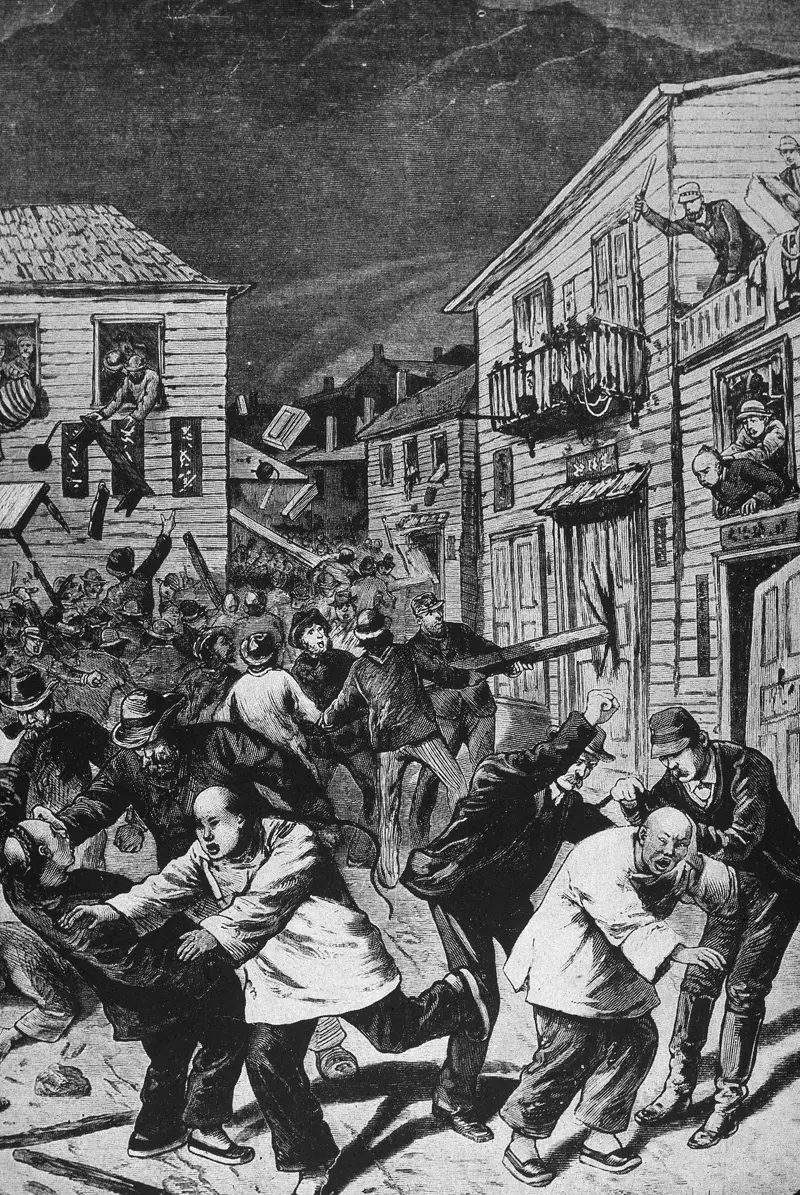
丹佛市政府17日举行仪式,正式向1880年华埠暴动受害家属后裔道歉,并承认「歧视华裔和亚裔」的黑历史;家族小企业毁于当年暴动的琳达‧龙(Linda Lung,音译)表示,市府道歉是一种认可,意义不凡。
国家广播公司(NBC)报导,现年69岁、住在丹佛郊区的琳达说:「长期以来,这项议题的氛围是三缄其口。」
丹佛失去了华埠,龙家依然在当地兴盛数代;琳达形容,这就是坚毅的试炼。她说:「我们以前在华埠很昌盛,现在依然是,这就是希望的愿景,囊括所有故事,也是我们不想失去的历史,关于科罗拉多州丹佛市华埠的过往。」
亚裔倡议团体「科罗拉多州亚太联合组织」(Colorado Asian Pacific United,简称CAPU)协助举办这场仪式,致力引起并延续各界对亚裔社区的关注。这项仪式由科罗拉多大学主持,市长汉柯克(Michael Hancock)代表向华裔后代家属致歉。
市府官员在致歉信件中强调,希望调解丹佛歧视与暴力对待亚裔的历史,「虽然无法抹灭过去对华人移民、亚太裔民族的不公义历史,现任政府承认犯错且(当时)未能纠正错误,是认可和尊重他们贡献的第一步,有助种族和解。」
信中表示,「这有助于教育那些不了解科州这段可耻历史的人,并慰藉亲人遭受种族暴力和虐待的后裔。」
人口统计局数据显示,亚裔目前占丹佛总人口的约4%。
CAPU副主席乔伊‧尼基塔‧何(Joie Nikita Ha,音译)表示,丹佛对华埠暴动认错,是接受丹佛种族历史伤痛的重要一步,「亚裔经常是隐形的少数,许多事情发生在亚裔群体间,却未被正视」。
Healthcare Certification and ESL Programs
然而,丹佛这场仪式过后会变得不一样,她说:「这是个开端,鼓舞人心,尤其是部分已在此生存数代的古老家族,他们对于丹佛及科州的贡献被严肃看待,他们所经历的苦难也会获得重视及认可。」
1880年的反华裔暴动始于艾谬森酒吧(John Asmussen’s Saloon)口角,最终演变成白人暴徒毁灭华埠和打砸商店,年轻小伙子陆扬(Look Young)被打死。
当地街角有一块纪念匾额,写着「老唐人街/1880年亚裔暴动」(Hop Ally /Chinese Riot of 1880);但社运分子认为,这段文本歧视亚裔。
乔伊解释,「白人昔称华埠为老唐人街(又称哈普胡同),那是贬意词汇,指华埠是鸦片吸食据点,尽管当年所有人都在抽鸦片。」
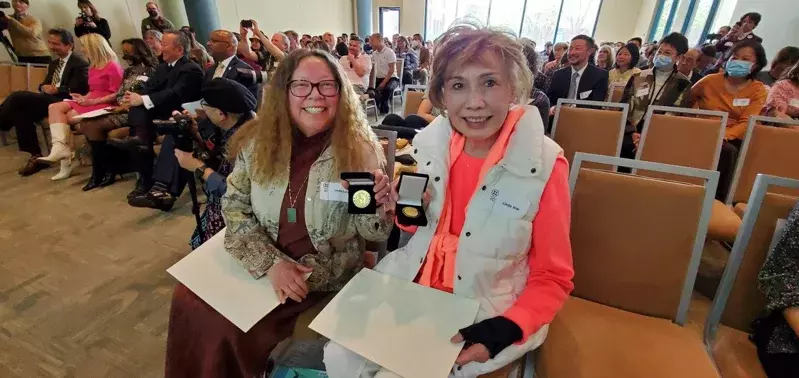
反对亚裔细分法案 网上近5000人参与连署
世界新闻网
11/29/2021
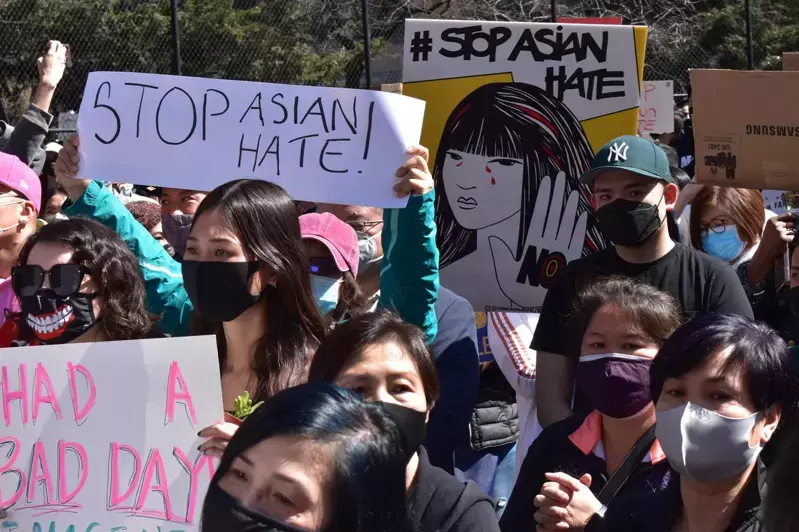
「亚裔细分」人口数据统计法案目前已在纽约州参、众议会通过,待州长霍楚(Kathy Hochul)后立法,不过该法案遭到亚裔社区反对;日前由亚裔父母平等联盟(Coalition of Asian Parents for Equal Rights)在网络上发起的反对连署,截至29日已经收集到4700多个签名,呼吁霍楚与社区站在同一阵线,共同反对法案。
该法案允许州府将亚裔再细分成各族裔,不再以群体概括归入同一类别,亚裔父母平等联盟在连署网站上表示,亚裔相较于其他族裔已经是少数群体,社区的声音很难让政府或相关机构听到,「这将进一步边缘化亚裔的声音,成为更容易受歧视的目标。」
细分亚裔的相关法案自2011年至今曾多次被提出,不过前州长葛谟(Andrew Cuomo)2019年否决,认为会加重财政负担和运作复杂性;霍楚为第二位考虑签署的州长。

Asian-American groups battle over state diversity data collection bill
By Morgan C. Mullings
11/19/2021
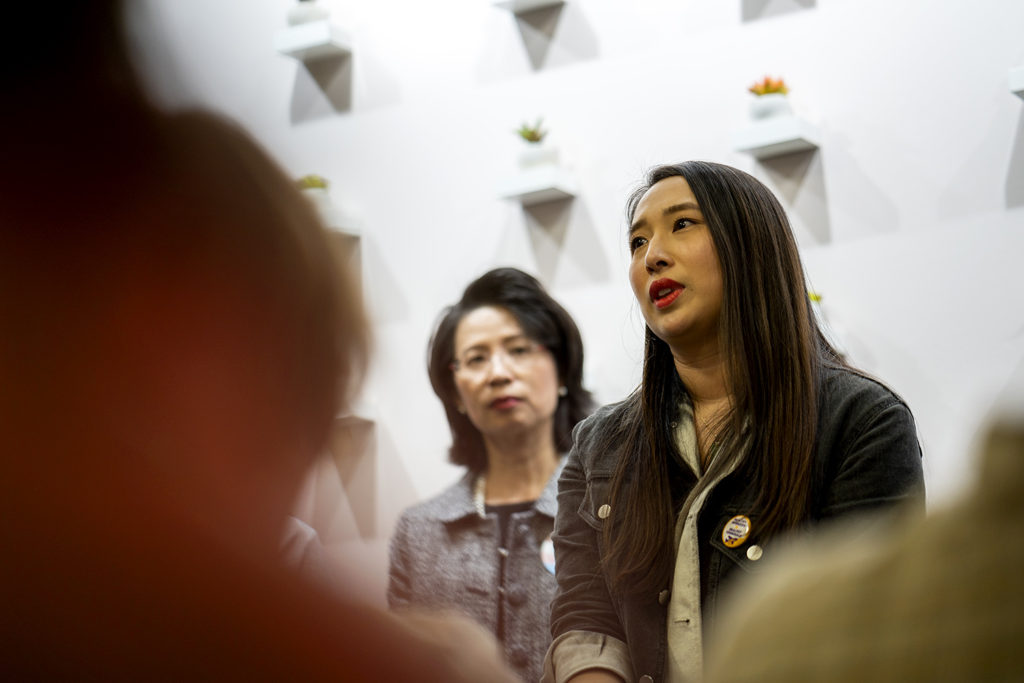
Several Asian American-led groups and legislators are supporting a bill that’s nearly at Governor Kathy Hochul’s desk, but one organization of conservative Chinese advocates wants it vetoed.
The Asian American and Pacific Islander (AAPI) Disaggregation bill, sponsored by Brooklyn state Senator Juila Salazar (D-Brooklyn), aims to diversify data collection of Asian Americans into more categories, as the demographic group represents over 30 countries.
But members of the Chinese American Citizens Alliance of Greater New York (CACAGNY) are asking Hochul to veto it, because of its alleged premise of lowering the political power of Asians in New York.
In a statement to the press, the organization said, “Why target Asians, right after the New York Post headlines an article heralding the new political power of Asians in NYC’s Nov. 2 voting? Why target Asians, just as NYC redistricting fights are heating up?”
Salazar’s legislative director, Mark Mishler answers these questions for PoliticsNY: “Senator Salazar … and many of her colleagues in the Senate and the Assembly strongly believe in the empowerment of the entire Asian American Pacific Islander community, and in providing services to the community that reflect the actual needs of different segments and sectors of that community.”
The law, which has passed in the Senate and Assembly, would require every state agency, board, department and commission to collect data with these new categories as quoted in the text of the bill:
“Each major Asian group, including, but not limited to, Chinese, Japanese, Filipino, Korean, Vietnamese, Asian Indian, Laotian, Cambodian, Bangladeshi, Hmong, Indonesian, Malaysian, Pakistani, Sri Lankan, Taiwanese, Nepalese, Burmese, Tibetan, and Thai; And
(B) Each major Pacific Islander group, including, but not limited to, Hawaiian, Guamanian, Samoan, Fijian and Tongan; or
(C) Other Asian or Pacific Island group.”
Many of Salazar’s colleagues that support disaggregation of Asian American demographic data are Asian, such as Lower Manhattan Assemblymember Yuh-Line Niou, and Queens state Senator John Liu – both of whom are Taiwanese American.
Both are also Democrats, which CACAGNY points out in their release. “One thing is certain: this is not a bipartisan bill. Each and every one of the sponsors and co-sponsors of the bill are from the same party,” the organization said.
They are concerned about too many designations for children from two or more cultures, and potentially pitting of some Asians cultures against others.
Mishler, who worked on the legislation, said the bill is actually aimed at understanding everyone’s differences so that the state can better provide for individual needs. In other words, not all Asian Americans want the same thing.
In a letter to the governor endorsed by over 30 Asian-led organizations, the Coalition for Asian American Children and Families said, “Enacting S6639A/A6896A into State law is of particular importance to the [Asian American and Native Hawaiian/Pacific Islander] community because data disaggregation has the unique ability to unify our diverse community.”
The Coalition, which leans liberal compared to CACAGNY, and many others disagree with the narrative that disaggregation bills foster division.
“Data disaggregation allows us to identify where particular struggles lie, so our community can step up to support those who struggle the most,” the Coalition said.
The coalition also believes that this bill can pave the way for improved data collection systems in other communities of color and in the LGBTQ+ community.
“Equipped with disaggregated data, the State can then leverage this information to more accurately innovate policy solutions and deploy much-needed resources toward the State’s most pressing priorities: COVID-19 vaccination, relief, and recovery efforts,” they wrote.
Asian American communities are not the only groups that struggle with perception. The Caribbean diaspora, Latin countries and people of African descent can be treated as monoliths in their own right, despite representing countries and cultures around the world.
Whether that benefits or harms them is up for debate within the community.
Even the term “AAPI,” which refers to the Asian American and Pacific Islander community, became popular after several instances of anti-Asian hate crimes this year, but is subject to scrutiny within the community. How non-white New Yorkers identify changes generationally — see the debate over the term Latinx, which is fairly new and used often by the media, but lacking support among the group it is used to identify.
The CACAGNY’s contribution to racial discussions often leans conservative. They’ve joined an energetic conservative campaign against the alleged Critical Race Theory (talk of which has fomented anger among conservatives over educating students about the historical result of racial discrimination in America’s institutions), and they work to end propositions they believe pit racial minorities against each other. Salazar’s office says they have this one wrong.
New York City to phase out gifted and talented public school programs that critics call racist
“The era of judging 4-year-olds based on a single test is over,” Mayor Bill de Blasio said.
By Jean Lee and Corky Siemaszko
10/08/2021
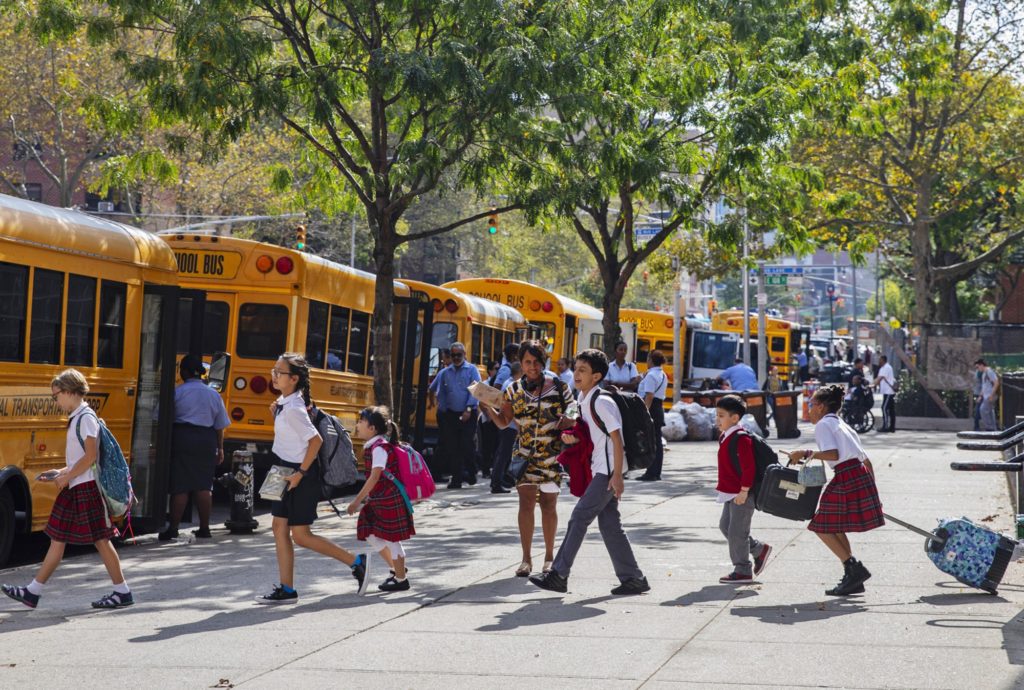
New York City Mayor Bill de Blasio unveiled a plan Friday to phase out the controversial gifted and talented programs for elementary school students that many educators say discriminate against Black and Hispanic children enrolled in the nation’s largest public school system.
It will be replaced by a program called “Brilliant NYC” that will expand the pool of students being offered accelerated learning, and not limit it to just the incoming kindergarteners who scored well on an optional exam that put them on a path to attend the city’s elite middle schools and high schools.
“The era of judging 4-year-olds based on a single test is over,” de Blasio said in a statement. “Brilliant NYC will deliver accelerated instruction for tens of thousands of children, as opposed to a select few. Every New York City child deserves to reach their full potential, and this new, equitable model gives them that chance.”
De Blasio’s announcement, which came in the waning days of his final term in City Hall, sent shock waves through New York City that are likely to be felt in public school systems across the country grappling with similar kinds of racial disparities.
The new plan comes two years after a diversity task force in New York recommended scrapping most selective programs that use test scores and other criteria to determine class placement, and which helped create a two-tier school system where 75 percent of the students in gifted and talented programs were either white or of Asian descent, while the students who didn’t make that cut were relegated to inferior schools with fewer resources.

Critics, including fellow Democrats, quickly pounced on de Blasio’s move.
“Gifted and talented programs have been an integral option for generations of schoolkids,” tweeted state Sen. John Liu, a Democrat from Queens who chairs a panel on New York City schools. “@BilldeBlasio promised intensive public engagement about it but now wants total elimination.”
Some public school parents also expressed alarm.
Marcia Benjamin-Charles, 44, the mother of two public school students in Brooklyn, said she fears de Blasio’s move will result in an exodus of bright students to charter schools.
“I’m African American, and a lot of African American children are going to charter schools now,” she said.
Benjamin-Charles said she considered moving her oldest child, who is now 20, to a charter school after the gifted and talented classes he attended until the 4th grade were discontinued at his school. But she ended up keeping him there and he graduated second in his class.
“I was a public school student,” Benjamin-Charles, who works as a transitional care manager, said. “I turned out fine. I want to give my children the same education.”
But Sok Svay of Queens, whose 14-year-old daughter is a public school student, said de Blasio’s new plan will level the playing field. She said that while her daughter is thriving despite not being in a gifted and talented program, basing children’s future on how they perform on a test taken at age 4 is unfair to the parents who have neither the time nor resources to prep their kids for this examination.
“It’s really exclusionary because when you think about a lot of immigrant parents who cannot read or do not have the time to go through this whole process, their kids will probably be missing out on better programs on account of just being shut out from understanding the process,” Svay, a Cambodian refugee who was raised in the Bronx, said. “Class segregation, which leads to racial segregations, needs to stop.”
Under de Blasio’s plan, students enrolled in the gifted and talented programs will stay in them. But the programs will no longer exist for incoming kindergarten students next fall.
Instead of the much-criticized entrance exam, the city will sort out which third graders should be put in accelerated classes by evaluating their school work and getting input from their teachers.
No longer will these students be separated from their other peers. Instead, they will spend several periods a day working on specific subject areas with specially trained teachers before returning to their regular classes.
The move also puts de Blasio’s likely successor, Eric Adams, in a bind. A Democrat in an overwhelmingly Democratic city, Adams campaigned on a promise to expand the existing gifted and talented program to lower-income neighborhoods and it would be up to him to implement this new program should he be elected.
“Eric will assess the plan and reserves his right to implement policies based on the needs of students and parents, should he become mayor,” Evan Thies, a spokesman for Adams’ campaign, told The New York Times. “Clearly the Department of Education must improve outcomes for children from lower-income areas.”
There was no immediate comment from Adam’s Republican rival, Curtis Sliwa.

Boston Overhauls Admissions to Exclusive Exam Schools
A new policy will increase representation of Black and Latino students in the prestigious public schools, which serve as a gateway to elite colleges.
By Ellen Barry
7/17/2021
BOSTON — Long into the night on Wednesday, parents and students waited in line to say their piece about Boston Latin School and who deserves to attend it.
Shirley Chen-Weng said she arrived in this country from China without speaking English, and raised her children to work hard and succeed. Why, she asked, shouldn’t they get a spot?
Julia Mejia, a Latina city councilor, said she spent her school years working at a shoe store to help her mother pay the rent, without a spare minute for test preparation. What about students like her?
And Gabby Finocchio, a 2019 graduate who is white, said she was admitted to the school because her parents had time and money to spend on the process. In a more equitable admissions system, she might not get in, she said, but “I’m OK with that.”
After five and a half hours of emotional discussion on Wednesday night, the Boston School Committee voted unanimously to overhaul admissions to the city’s three selective exam schools, opening the way for far greater representation of Black and Latino students.
The new admissions system will still weigh test results and grades, but, following a model pioneered in Chicago, it will also introduce ways to select applicants who come from poor and disadvantaged neighborhoods.
Under the new system, the applicant pool will be divided into eight groups based on the socioeconomic conditions of their neighborhoods. The admissions team will consider applicants within each group, admitting the top students in each tier in roughly equal numbers.
“This was really a watershed moment,” said Ruthzee Louijeune, 34, the daughter of Haitian immigrants, who said she was admitted to Boston Latin School only after her father stumbled across a free test preparation course. That path, through a school that “can literally open a door to endless possibilities,” led on to Columbia University, Harvard’s John F. Kennedy School of Government and Harvard Law School.
“If any of those events didn’t happen, I don’t know where I would be today,” said Ms. Louijeune, who is running for Boston’s City Council. “The world has been open to me. How do we make sure I am not an anomaly?”
The traditional admissions system, which its supporters defend as merit-based, ranked applicants according to grades and test scores. But it also gave rise to a culture of tutoring and test preparation, and resulted in incoming classes that were overwhelmingly white and Asian.
Boston has joined a long list of school districts trying to address racial inequities in its selective academic programs. The debates have divided communities, raising painful questions about whose children deserve to be admitted.
In New York City, the nation’s largest school district, a recent push to eliminate an admissions exam for its top high schools has sputtered, even as the city announced other changes to the way hundreds of selective middle and high schools choose their students.
A proposal by Mayor Bill de Blasio to get rid of the entrance exams to the city’s most elite schools, such as Stuyvesant High School, became extremely divisive, prompting accusations that he was discriminating against low-income Asian American children and pitting Asian families and Black and Latino families against one another. In the end, the State Legislature, which had to approve the change, declined to take action.
Fairfax County, Va., faced a similar challenge. In 2020, the school board agreed to eliminate the admissions test to its flagship math and science magnet school, only to face two lawsuits from families, many of them Asian American, who said the move had inflicted harm on their children.
The same divisions have emerged in Boston. Among the most passionate objections expressed on Wednesday night came from Asian American parents, who said their children were hardly all affluent, and would be unfairly disadvantaged by the new system.
Asian American students were 29.3 percent of Boston Latin School’s enrollment in 2020, despite making up 9 percent of students in the school’s district.
“When they were young, we instilled them with the idea of working very hard to be the best,” said Ms. Chen-Weng, speaking through a Cantonese translator. “There’s a misconception that we’re discriminating against others, but that’s not true, because when we came here, we had nothing. We worked hard to get what we could get.”
Judith Nee, an alumna of Girls’ Latin School, said the white students affected by the change were “firefighters and civil servants’ kids,” not the truly affluent.
“What does it get you other than depriving everyone of perhaps the one real advantage to step up in the world — by weakening the rigor of Latin?” Ms. Nee said. “I literally get sick to my stomach with the thought that we are going to alter a 350-year-old proven world-renowned pathway to a life of intellect. It’s not easy to come by for city kids.”
For decades, sixth graders across the city have crammed for an annual entrance exam, hoping to receive an invitation to Boston Latin School, the most selective of the three schools, which counts among its alumni four presidents of Harvard, four Massachusetts governors and five signers of the Declaration of Independence.
Ms. Finocchio, who entered Boston Latin School as a ninth grader, said it did not take long for her to see patterns in the neighborhoods her classmates came from — middle-class and predominantly white — and by her sophomore or junior year, she was convinced that something needed to be done about it.
“Once I realized how the system works, it was a question of, OK, when are they going to change it?” she said.
Ben Hoffman, 20, who graduated in her class, said he routinely overheard older people fretting about whether the quality of the schools would suffer, “thinking it’s going to be the worst thing ever, and ultimately change the school.” He doesn’t agree. “To some extent, I am puzzled about why so many people in that demographic think it’s going to be a problem,” he said.
It is no surprise that the change is occurring now, as Boston itself has changed.
The middle-class, predominantly white neighborhoods that fed large numbers of seventh graders into exam schools each year had resisted attempts to change admissions, said Lew Finfer, an organizer with Massachusetts Communities Action Network, who has pushed for new policies for 20 years.
But the political clout of those neighborhoods had begun to wane even before last year’s racial justice movement swept through the city, he said, while also crediting “relentless efforts” by Boston’s N.A.A.C.P. and other legal advocates for the new policies.
“There was a degree of reckoning with the George Floyd murder that made it harder to defend sacred cows that were discriminatory,” he said. “That doesn’t mean every institution changed, or every policy. But there was more pressure to deal with things.”
In 2019, voters elected a City Council that was, for the first time, dominated by women and people of color. And all four front-runners in November’s election for mayor are women of color. Among the leading candidates for mayor, only one — City Councilor Annissa Essaibi George — has objected to the change in policy, tweeting that it had been voted in hastily.
“While the plan claims to level the playing field and create improved access, it has not,” she said. “It is unclear, untested and not informed by families across the city.”
City Councilor Andrea Campbell, a Boston Latin School graduate who is also running for mayor, said in a statement that she had “heard from hundreds of parents who are excited by the change and just as many who are worried about how this new policy will impact them because they don’t see another excellent option for their student in the B.P.S. system, which I think proves that this inequitable system is failing all of us.”
Many expect the new policy to face a court challenge. But others were in the mood to celebrate.
“There’s a historical debt owed to families and students of color in Boston public schools,” said Peter Piazza, an educational researcher, describing a litany of efforts to resist desegregation of city schools, including violent riots over busing that shook the city in the 1970s.
“The so-called exam schools are one tiny part of this history,” he said. “But the access is enormously important for the students, whose lives can be changed by the opportunity. We owe them a debt. Let’s pay it at 100 percent.”
Boston’s racial tensions have always spilled out into public view when the subject turns to schools. The tug of war over exam school admissions has led to the awkward and abrupt departure of three members of the school committee.
The committee chair, Michael Loconto, resigned last fall after he was caught, during a recorded Zoom meeting, mocking the surnames of Asian American parents making public comments on the issue.
That was followed by the publication of text messages exchanged between two other members, Alex Oliver-Dávila and Lorna Rivera, expressing frustration with parents from West Roxbury, whom one of them referred to as “Westie whites.”
Both Ms. Oliver-Dávila and Ms. Rivera resigned, too.
TJ High School Admits 550 Students Under New Admissions Policy
Thomas Jefferson High School for Science and Technology, a top high school in the U.S., admitted students under a revised admissions policy.
By Emily Leayman
6/24/2021
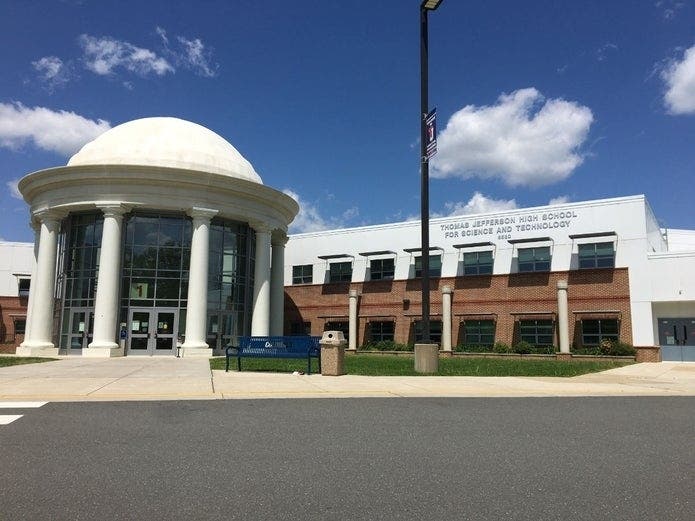
FAIRFAX COUNTY, VA — Thomas Jefferson High School for Science and Technology, a governor’s school and one of the nation’s top high schools, announced the incoming freshman class chosen with the new admissions policy.
TJ admitted 550 students for the class of 2025. The Fairfax County School Board has voted to change the admissions policy, eliminating the standardized admissions test, eliminating the $100 application fee, raising the minimum grade point average, and increased the freshman class size from 480 to 550.
Spots in the class of 2025 were determined by the top 1.5 percent of applicants from every middle school. For the first time in at least a decade, every Fairfax County Public Schools middle school has students who were accepted to TJ.
The school saw an increase in applications this year — 3,034 compared to 2,539 in the last school year. The 3.9074 average GPA of applicants was higher than recent years, while the 3.9539 average GPA of accepted students was similar to past years.
As the admissions policy changes aimed to increase access to underrepresented student groups, there were some increases in several demographic groups. Black students made up 7.09 percent of accepted students, while last year’s admission was “too small for reporting,” meaning 10 or less. Hispanic students made up 11.27 percent of accepted students, compared to 3.3 percent last year.
The percentage of white students admitted also increased from 17.7 percent to 22.36 percent. Asian students still represent the majority of admitted students, although the percentage fell from 73 percent to 54.36 percent.
The percentage of economically disadvantaged students admitted also had a significant increase from 0.62 percent to 25.09 percent. Special education students represent 2.36 percent of accepted students, and English Language Learners represented 7.09 percent.
The Coalition for TJ, a group of parents, students, alumni, staff, and community members opposed to the admissions changes, responded to the admissions announcement in a statement. The coalition believes the changes discriminated against Asian students and has an active federal lawsuit.
“We love Thomas Jefferson High School for Science and Technology, and we congratulate every student accepted for admission into the TJ Class of 2025,” the coalition stated. “Fairfax County Public Schools has also broken the hearts of many deserving students by waging a crusade against Asian students at the school, first by proposing a random lottery and later by implementing the current race-balanced ‘holistic’ admissions system that amounts to social engineering.”
The coalition also denounced critical race theory, an academic concept studying how racism can be found in various public policies. Opponents see it as a wedge that pits people of color against white people, according to Education Week.
“We seek fairness for all families and students, and we reject the racism of the ideology of ‘critical race theory’ that promotes admissions lotteries and race quotas while killing merit,” The Coalition for TJ stated. “We will continue to fight for an American Dream in which all people have equal protection under the law.”
Thomas Jefferson High School is an admissions-based governor’s school open to students in Fairfax County as well as Arlington, Loudoun, and Prince William counties, and cities of Fairfax and Falls Church. The school was recently ranked the top high school in the nation by U.S. News and World Report.

Parents Defending Education
4/19/2021
Parents Defending Education is a new grassroots organization determined to fight woke indoctrination in classrooms nationwide. “We believe our children’s education should be based on scholarship and facts, and should nurture their development into the happy, resilient, free-thinking, educated citizens every democracy needs,” the organization says.
The website DefendingEd.org features a robust IndoctriNation Map, where visitors can “learn about parent organizations, incidents and FOIA’s” in their area. And Parents Defending Education wants to hear from you: click here to help them shine a light on educational malfeasance in Fairfax County Public Schools!
A new video from Parents Defending Education succinctly conveys the organization’s vision. “I want my child to learn how to think, not what to think,” the voiceover says. “But in K-12 schools today, activists are pushing a radical new agenda. Instead of creating educated individuals, they are trying to create activists, turning blank slates into members of racial, ethnic or gender groups in conflict with each other — but it doesn’t have to be like this.”
Source: https://fairfaxgop.org/watch-parents-defending-education/
A Lawsuit Challenges TJ Admission Changes
Parents sue to stop TJ’s admission policy changes, alleging anti-Asian race discrimination.
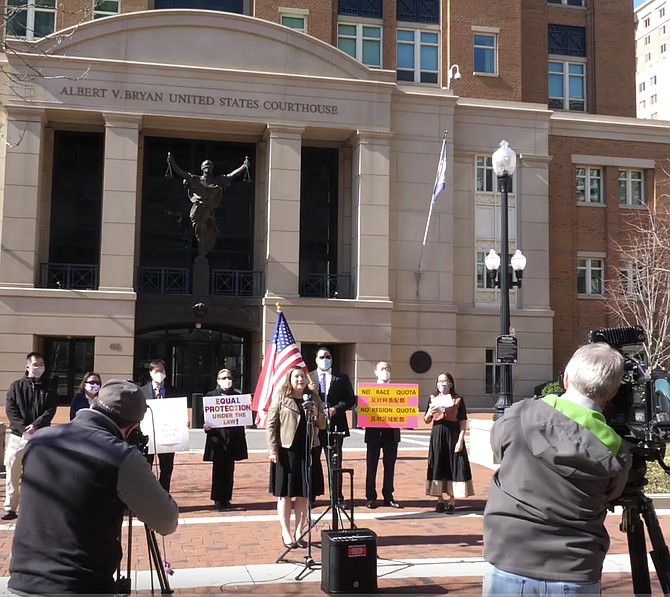
By Mercia Hobson
3/19/2021
The Fairfax County School Board and Fairfax County Public Schools Superintendent Dr. Scott Brabrand face a new lawsuit filed against them last week in United States District Court in Alexandria. The lawsuit alleges race discrimination against Asian-American students by the School Board and the superintendent in changing the admissions process to Thomas Jefferson High School for Science and Technology, known as “TJ.” The Pacific Legal Foundation filed the civil suit on Wednesday, March 10, on behalf of their client, Coalition for TJ, a group of mostly concerned parents at the high school.
#“This type of racial balancing is unconstitutional,” said Pacific Legal Foundation attorney Erin Wilcox at a press conference held that morning outside the courthouse.
#The Plaintiffs allege FCPS’ recently-implemented overhaul of the TJ admissions process changes, which eliminated the long-standing race-neutral standardized admissions test, is specifically aimed to reduce the number of incoming Asian-American students to racially balance the school according to the racial demographics of the school. “Up until this year, admissions to TJ have been race-blind,” said Wilcox. “Unfortunately, Fairfax County Schools officials apparently believed that this is too many Asian students,” she said.
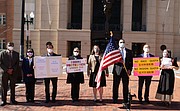
Pacific Legal Foundation holds a press conference on March 10 announcing that they filed a lawsuit against the Fairfax County School Board and Superintendent Scott Brabrand on behalf of their client, Coalition for TJ, challenging recent changes to the admissions policy at Thomas High School for Science and Technology.
#THE COMPLAINT alleges that without the court issuing an injunction, the number of Asian-American students in the incoming TJ Class of 2025 is likely to be cut in half due to the “defendants’ stated desire to manipulate TJ’s demographics.” “The discriminatory intent they’ve shown is intertwined and an inseparable part of the policies they put in place,” Wilcox said.
#According to the lawsuit, in the fall of 2020, Superintendent Brabrand and the School Board saw a reporting requirement by the Virginia Department of Education to include the racial/ethnic make-up and socioeconomic diversity of its students, faculty, and applicants as an opportunity “to completely overhaul the TJ admissions process in order to racially balance the school’s demographics, going far beyond the minimal reporting requirements.”
#Located in Alexandria, TJ is a regional Virginia state-chartered magnet school operated by FCPS with students eligible for admission from Fairfax, Arlington, Loudoun, and Prince William counties, and the City of Falls Church. TJ is ranked the number one public high school in the 2020 National Rankings.
#The School Board voted to eliminate the TJ merit-based admissions test at its Oct. 6 work session with no public comment opportunity. The complaint quotes Brabrand during the discussion at the work session with the Board to say that eliminating the merit admissions test “eliminat[es] the testing component that squeezed out talent and squeezed out diversity in our system.” Board members said they hoped the new process increased Black and Hispanic representation in the student body.
#On Dec. 17, the School Board voted and adopted, with immediate implementation, further changes to the TJ admissions policy applicable to the incoming TJ freshman Class of 2025 and to future years. The Board adopted the challenged admissions policy that limits the number of students accepted from each county feeder middle school to the top 1.5 percent who meet the minimum evaluation criteria-GPA, student portrait sheet, problem-solving essay, and experience factors: including economically disadvantaged students, English language learners, or special education students.

#The lawsuit alleges that coupled with the high concentration of Asian-American students at four middle schools – Carson, Kilmer, Rocky Run, and Longfellow – and their history of sending large numbers of students to TJ, racial balancing could be accomplished.
#According to the complaint, the plaintiffs sought “to vindicate the rights of Asian-American public school children in and around Fairfax County, Virginia, to compete on an equal footing for admission to the nationally-ranked Thomas Jefferson High School for Science and Technology (TJ) without regard to their race.” Overall, Plaintiffs’ data analysis reported in the complaint that the student body at TJ, at approximately 73 percent Asian-American students under the merit-based race-blind admissions system would drop to 31 percent under the new racial-balancing admissions system for the Class of 2025 with “no other racial group projected to lose seats.”
#The lawsuit alleges changes to admissions violate the Equal Protection Clause of the Fourteenth Amendment “…a promise that government at every level will treat every American as an individual, not simply as a member of his or her racial group. Policies like the one implemented by FCPS stand in direct opposition to that promise.”
#THE PLAINTIFFS requested entry of an order requiring the Defendants to return to the admissions procedure for entry into TJ in the fall of 2020. “The Coalition for TJ is not going to stand for this kind of discrimination against Asian-American students and they are here to fight for equal protection for their children,” said Wilcox.
#Julia McCaskill, an immigrant, and parent of a TJ student and students in grades 8 and 6, said at the March 10 press conference that TJ does not belong to a certain race or certain group of people. Low admission rates at TJ for Black and Hispanics are the failure of the FCPS Board, according to McCaskill. “They failed those under-represented areas over the decades instead of fixing the pipeline issue. The authorities are stirring up hate against Asian-Americans hoping to slash the number of Asian-American students will fix the overdue school problem.”
#Asra Nomani, a cofounder of Coalition for TJ and parent of a senior at TJ, said during the press conference that she came to the United States at age four from India. Nomani said she was proud to be working the past nine months with families who came to the United States from communist China and eastern Europe, India, and other places where they faced injustice. “They never could have imagined that they would face injustice in America,” she said.
#A Fairfax County Public Schools spokesperson provided a statement saying, “The process continues to be race-neutral and merit-based… As a Governor’s school, we value diversity and believe that it contributes to the richness of the education at TJHSST.”
#Parents of 17 middle school students filed the initial lawsuit in November 2020 to overturn the School Board’s decision to eliminate the standardized admission test for TJ and the $100 application fee. On Feb. 2, a Fairfax Circuit Court Judge John M. Tran denied the parents’ request to require mandatory standardized testing in the admissions process. Tran said, “The debate over standardized testing belongs to educational professionals.”
#On Friday, March 12, Wilcox said that the next step would be the defendants’ response, either an Answer or a Motion to Dismiss, in approximately 60 days. “I’ve seen in various news articles that FCPS issued a statement on Wednesday. Their legal response to our complaint will be one of the documents mentioned,” Wilcox said.
Source: http://www.connectionnewspapers.com/news/2021/mar/19/lawsuit-challenges-tj-admission-changes/
Judge declines to halt elite school’s admissions changes
2/04/2021
FAIRFAX, Va. (AP) — A judge on Tuesday refused to issue an injunction to stop an elite northern Virginia high school from changing its admissions policies.
Fairfax County Public Schools is overhauling the admissions process at Thomas Jefferson High School for Science and Technology, which has been ranked as the top public high school in the country.
The school board hopes the changes will increase diversity at the school, which has long failed to attract Black and Hispanic students. Standardized tests that have long been part of the admissions process have been scrapped in favor of a more holistic review.

Supporters of the existing system sued, citing state regulations designating TJ as a school for the gifted and stating that giftedness should be measured by a standardized test.
Circuit Court Judge John Tran declined to issue an injunction that would immediately bar the changes from taking effect, but the lawsuit itself can still go forward.
A conservative legal group is also weighing a challenge based on racial discrimination against Asian Americans who currently make up a majority of the student body.
Students, Parents Challenge TJ Admissions Changes
Coalition for TJ | Press Release
11/07/2020
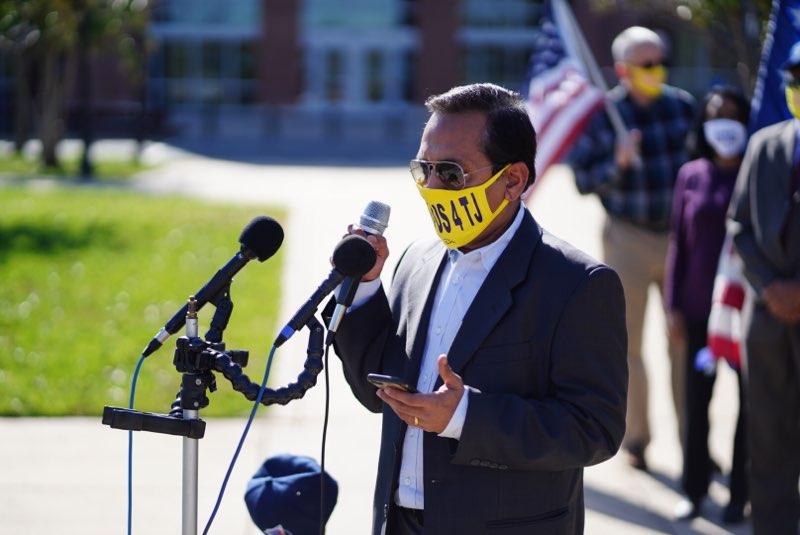
Seventeen parents filed a lawsuit against the Fairfax County School Board and Fairfax County Public Schools Superintendent Scott Brabrand for illegally changing the admissions process at Thomas Jefferson High School for Science and Technology.
TJ, as the school is known, is the nation’s top-ranked public high school, according to U.S. News & World Report. Established in 1985, the STEM-focused Governor’s School has long maintained rigorous, merit-based, race-blind admissions standards that include the administering of a set of standardized tests. In an October 6 work session, however, the Fairfax County School Board voted to abolish the school’s admissions tests, and the superintendent abruptly eliminated the tests from this year’s admissions process.
The lawsuit alleges that the school board and superintendent violated state laws and regulations requiring that a “nationally norm-referenced aptitude test” be used as part of the TJ admissions process to identify gifted learners with an aptitude for STEM. As a Governor’s School, TJ provides services to gifted students, or advanced academic learners, and receives special funding from the Commonwealth for this purpose.
Today, the Coalition for TJ held a press conference outside the Fairfax County Courthouse, announcing that the 17 parents had filed a lawsuit against school officials. “The basis for the complaint against Fairfax County School Board and Scott Brabrand is relatively simple,” Coalition for TJ co-founder Glenn Miller said at the news conference. “Virginia law, which is the superior law and controls the actions of Fairfax County and its school board, contains specific requirements that must be followed in order to admit students to TJ. Fairfax County and its school board violated those laws. As such, the Fairfax County School Board and the superintendent acted beyond their authority and acted arbitrarily and capriciously.”
The abolition of TJ’s standardized admissions tests will invariably reduce the number of Asian students at the school. The lawsuit’s 17 plaintiffs are families of current middle schoolers who are disadvantaged by the admissions changes. Plaintiff James Pan, father of a gifted middle schooler, spoke at today’s press conference. “FCPS is using the pretext of banning the test for their goal of reducing Asians at TJ,” Pan said. “The government is using a process that is plain old bigotry.”
Plaintiff and middle school parent Srinivas Akella said that he chose to live in Fairfax County for its program for gifted students and for TJ, in particular. “The school board and FCPS arbitrarily made changes to the admissions process in violation of state law,” Akella said today. “I have faith in our judiciary, and I am petitioning them as a last avenue since there was no other recourse left for me to pursue.”
Following the plaintiffs’ remarks at today’s press conference, Coalition for TJ co-founder Asra Nomani spoke of the opportunities that TJ has afforded generations of immigrants in Fairfax County. “My father came here for the American Dream. My son pursued it here in this country and is now a student at Thomas Jefferson High School for Science and Technology,” Nomani said. “We should not allow anyone — including the Fairfax County School Board and Superintendent Scott Brabrand — to stand in the way of justice. We are all here for the justice that America provides, and I applaud these courageous families.”
WATCH:
•Nov 5, 2020











